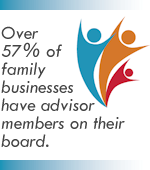![]()
Board Optimization
There are many type of boards of directors. Yet family business boards carry greater responsibilities. They often are tasked with doing the bidding of family members who are the actual owners of the business. Their decisions not only affect the company and its employees but also the family members and their ability to create income, manage risk, and protect their interests.
 If the board is out-of-touch with the needs and requirements of the business, this can be disastrous. Yet if the board is represented by members with management and industry expertise the board can be an invaluable resource in focusing on the strategic issues which guide the business and the family stakeholders to continued prosperity from generation to generation.
If the board is out-of-touch with the needs and requirements of the business, this can be disastrous. Yet if the board is represented by members with management and industry expertise the board can be an invaluable resource in focusing on the strategic issues which guide the business and the family stakeholders to continued prosperity from generation to generation.
Types of Boards
Below are the four most common type of boards:
- Compliance Board - This is board that is required in most states. It must have at least one person that meets at least once per year. Usually this is the founder of the company and this meeting is more of recordkeeping event and never actually happens.
- Insider Board - This is an actual board that includes family members and members of the company’s management. Again this is often a formality and the founder/owner(s) retain decision-making authority. They may discuss critical issues related to the business and vote on resolutions.
- Inner Circle Board - This type of board may be have an advisory component to it in that it adds outside professionals such as consultants, a CPA, attorney industry specialist, tec. These outside professionals can help the founder and family members to guide the company.
- Independent Board - This is the highest level of board compliance usually reserved for public companies or large family business enterprises. The directors are typically not employed by the company nor do they have ties with the company as in Inner circle board. They are often paid for their board role and introduce the highest level of objectivity.
Typical Duties of Directors
The board meetings for smaller companies are often focused on the most critical issues of the day such as hiring decisions, policy changes, performance concerns, financial decisions, resources allocation, approving budgets and accounting to the stakeholders. This is where an Inner Circle Board can be most valuable. Some boards actually add a “panel of advisors” or an “advisory Committee” to their family board. This can be a very valuable component both for the family stakeholders as well as the management team.
No Man is an Island
I often hear from founders that they don’t need a board because they already know what’s right for their company. It is true that founders of family businesses are proud of what they have accomplished and rightfully so but as the business environment shifts, product and services tastes evolve and customer demand and business model may change it may be important to get the perspective of vertical professionals. An established advisory or Inner Circle board that understands the business may help the founder to respond to such challenges with sound advice.
Reasons Family Businesses Resist Advisory Board Members
- Don’t want to give up control
- Concerns about sharing confidential information with outsiders
- No time for the formalities of having a board
- Costs required
Expectations of a Family Business Inner Circle or Advisory Board
In short the external members of a family business board can help the founder, successors, family members and the management team to prepare for the future. The changing business environment, or were unsuccessful in their expansion efforts. It is worthwhile for whomever is running a family company to consider getting input in the areas of managing the business (outlined below) before executing on major decisions.
- Change in the direction of company strategy
- Recruiting critical management or staff
- Evaluation and retaining key management personnel
- Compensation evaluation
- Training initiatives
- Compliance, ethical and legal aspects
- Risk management
- Culture change
- Exit planning or preparing the company for sale
- Critical transactional events
- Public relations, spin-control and branding evolution
- Effective technology leverage
- Facilitating family members and board communication and dynamics

Benefits of Creating an Advisory Panel to your Family Business Board
- Separating the company’s needs from the family’s needs
- Perspectives, experiences, networks
- Help the CEO look beyond tactical issues
- Accountability
- Risk management
- Objectivity and independence
- Planning/advising on succession of founder or management team
- Smoothing ownership transition to the next generation
- Planning/advising on exit strategies
How well-equipped is the next generation in navigating your business through the challenges of the coming decades? Download our FREE Generational Planning Guide.